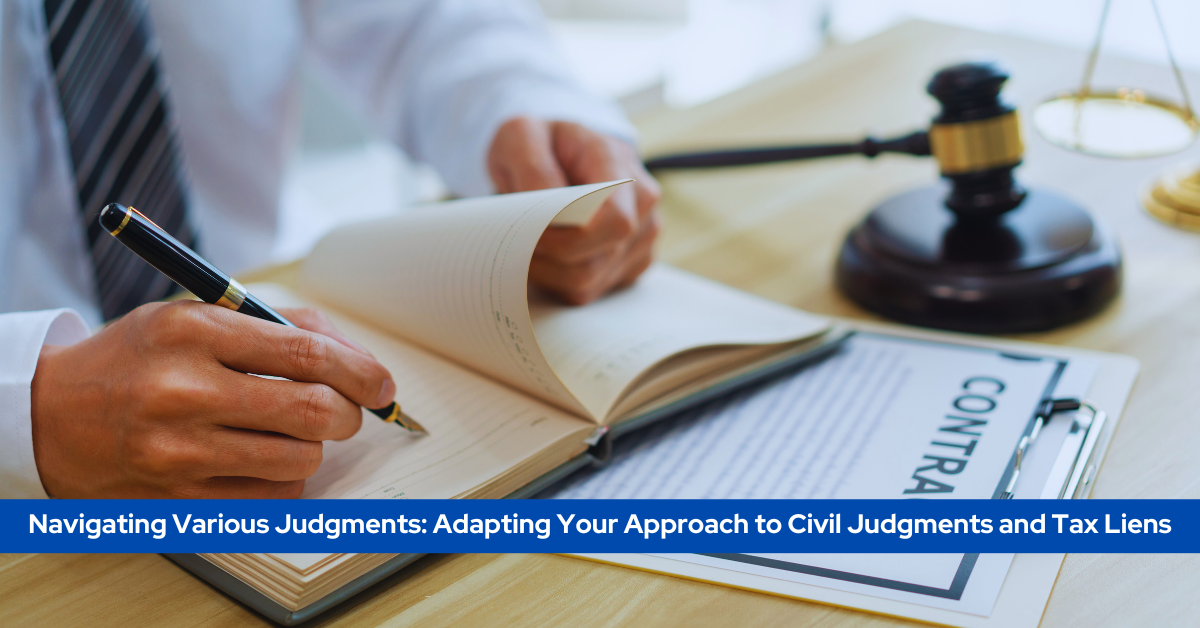Legal judgments and tax liens are two key obstacles that can have far-reaching effects for people in the complicated world of personal finance. Even while all situations could involve a court, each one is unique and calls for a different approach to settlement. Anyone who finds themselves involved in court processes or dealing with tax debt must understand how to deal with these financial difficulties.
Civil Judgments: The Weight of Legal Decisions
Civil judgments are the results of court cases involving people or organizations. These conflicts may involve a variety of matters, including breach of contract, personal injury lawsuits, property disputes, or debt collection. A financial award that the losing party must pay is frequently included in a court’s decision in favor of one party. If you don’t follow the court’s order, you could face additional legal repercussions like asset seizure and wage garnishment.
Assessing the Impact:
Understanding a civil judgment’s implications completely is the first step in dealing with it. Judgments can have a negative impact on your credit score because they are frequently public information. The future acquisition of loans, credit cards, or mortgages becomes difficult as a result. Therefore, it’s critical to understand the judgment’s facts, including the debt’s size, payment requirements, and any applicable interest.
Negotiating a Settlement:
When facing a legal judgment, it’s often a wise strategy to pursue a compromise with the creditor. If the creditor has concerns about your capacity to repay the full judgment amount, they may be willing to accept a lump-sum payment for less. Alternatively, proposing a structured payment plan is an option, though be prepared for potential objections and counteroffers from the creditor.
Credit Restoration:
It’s crucial to address the impact on your credit score. Boosting your creditworthiness might involve considering the services of a credit repair company. Responsible financial management can contribute to gradual credit repair over time.
Consult with Legal Aid:
If you believe the judgment is unjust or encounter challenges during the negotiation process, it’s advisable to seek guidance from an attorney. Legal counsel can assess the legality of the judgment and explore potential avenues for resolution.
Bankruptcy Consideration:
While it should be a measure of last resort, in dire situations, bankruptcy may be the sole option for discharging or restructuring your debt. To weigh the advantages and disadvantages of filing for bankruptcy, it’s vital to consult with a bankruptcy attorney. Filing for bankruptcy can have enduring effects on your financial standing.
Tax Liens: The Government’s Claim on Your Assets
Contrarily, when people or corporations don’t pay their tax arrears, the government may impose tax liens as a form of legal action. The implications of having a tax lien are serious, and these tax authority can be federal, state, or municipal.
Comprehending Tax Lien Categories:
Tax liens primarily fall into two categories: federal and state/local. State and local tax liens are initiated by the respective government bodies of those areas, while federal tax liens are issued by the IRS. Both have the capacity to result in the government seizing your possessions, such as your house, vehicle, and bank holdings.
Engaging in Negotiations with Tax Authorities:
Tax authorities often entertain the prospect of negotiation and may be open to devising a payment plan or potentially agreeing to a reduced amount as settlement for the debt. However, it is essential to prove your financial hardship and willingness to collaborate.
Releasing the Lien:
Once you’ve completely paid off your tax debt, it’s crucial to collaborate with the relevant tax authority to have the lien removed. Your credit score and financial stability hinge on this action.
Offer in Compromise (OIC):
Under specific circumstances, you may qualify for an OIC, which allows you to settle your tax debt for less than the full amount owed. For example, the IRS considers an OIC by evaluating your capacity to pay, income, expenses, and asset equity.
Bankruptcy:
Much like dealing with civil judgments, addressing tax liens may entail pursuing bankruptcy. However, it can be a challenging and not always the most favorable method for discharging tax obligations through bankruptcy.
Adapting Your Approach: Common Strategies
While civil judgments and tax liens present distinct financial challenges, the following universal strategies can be adapted to effectively address both situations:
Communication:
Effective communication with creditors, tax authorities, and legal experts is paramount. Openly sharing your financial status and demonstrating a willingness to collaborate is crucial for achieving favorable outcomes.
Financial Planning:
Developing a comprehensive financial plan is of utmost importance. By gaining a deep understanding of your income, expenses, and available resources, you can assess how much you can feasibly allocate toward your debt.
Seek Professional Advice:
In both situations, speaking with experts is frequently a sensible choice. Credit repair agent, tax consultants, and attorneys can all offer insightful advice.
Budgeting and saving:
Establish a spending plan that enables you to set aside some of your income for debt repayment. You can eventually fulfill your financial commitments using this methodical technique.
Timely Action:
Take prompt action and deal with these problems right now. Negotiating and resolving these financial issues may grow more difficult the longer you wait.
Educate Yourself:
Your best line of defense is knowledge. Understand your rights and obligations in these circumstances, as well as the range of options you have.
Record-keeping:
Keep complete records of all communications with lenders, tax authorities, and attorneys. If disagreements occur, this paperwork may be crucial.
Conclusion
Finally, while dealing with civil judgments and tax liens might be daunting and difficult, it is not impossible. You can attempt to resolve these problems and achieve financial stability by being aware of the nature of these financial challenges, modifying your strategy, and getting professional advice as necessary. There are ways to get over these challenges and guarantee a more promising financial future, whether through settlement, litigation, or negotiation.
FAQs
1. What financial effects might a civil decision have?
Your ability to obtain loans or credit may be hampered by a civil judgment that has a negative effect on your credit score. Additionally, it can result in asset seizure and pay garnishment.
2. What should I do if a civil judgment is rendered against me?
Analyze the specifics of the verdict, negotiate a settlement, think about credit rehabilitation, get legal help if necessary, and, as a last resort, look into bankruptcy options.
3. How can I bargain with tax authorities to get a tax lien removed?
Talk to the tax authorities and be prepared to help. In certain situations, you can negotiate a payment schedule or even an Offer in Compromise (OIC).
4. Can I get a bankruptcy discharge for my tax debt?
While it is feasible, it can be difficult and may not always be the best option to discharge tax liability through bankruptcy. To assess your choices, talk to a lawyer.
5. How can I safeguard my finances in the face of court orders and tax liens?
Develop a financial strategy, get professional advice when necessary, make a budget, keep lines of communication open with creditors or tax officials, and move promptly to resolve any concerns.




